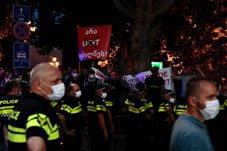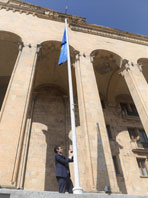
International partners condemn radical developments in Tbilisi, MEPs 'deplores' Georgian government for inactivity
By Khatia Bzhalava
Thursday, July 8
On July 6, far-right protesters gathered on Rustveli avenue to protest against peaceful anti-violence and pro-LGBTQI+ protests that were held in response to the homophobic and violent events of July 5. The participants of the peaceful solidarity rally included political opposition, independent citizens, and LGBTQI+ supporters.
According to the Georgian Interior Ministry, Police detained over a hundred activists of violent ultranationalist groups on administrative offences as the July 6 rally “exceeded the limits of the law on freedom of expression and peaceful assembly.” As the ministry notes, 68 detainees have been released on parole, while 32 remain in temporary detention. Police also detained two individuals on criminal charges for violence against a Palitra News cameraman and damaging the side windshield of a police car.
Violent right-wing groups took over the peaceful protest and injured citizens and law enforcement as they threw rocks and iron bars at them. Following the hours-long tensions, after the For Freedom rally activists left and the police escorted the journalists, the radical protesters took down and burnt the LGBT, as well as European Union, flags. Yesterday, Georgian Parliament Speaker Kakha Kuchava raised the European Union flag in front of the Georgian parliament again, stating that “destruction of the EU flag is unacceptable.”
The events caused critical responses from international partners. The US Department of State condemned the violent attacks on civic activists, community members, and journalists. Ned Price, Department Spokesperson stressed during the press briefing on Wednesday that Georgia’s leaders and its law enforcement officials are obligated to protect the constitutional rights to freedom of expression and freedom of assembly.
Members of the European Parliament have made a joint statement, decrying the violent actions of July 5, when civil activists, community members, and journalists were physically assaulted by the radical groups.
“Unfortunately, the Georgian authorities and religious representatives failed to speak loud and clear against homophobic rhetoric in the run-up to the Pride March. We deplore the Georgian government’s lack of readiness to guarantee the safety of this gathering devoted to tolerance,” reads the joint statement.
The MEPs reminded the Georgian government that an EU membership candidate country should have "stability of institutions guaranteeing democracy, the rule of law, human rights and respect for and protection of minorities."


